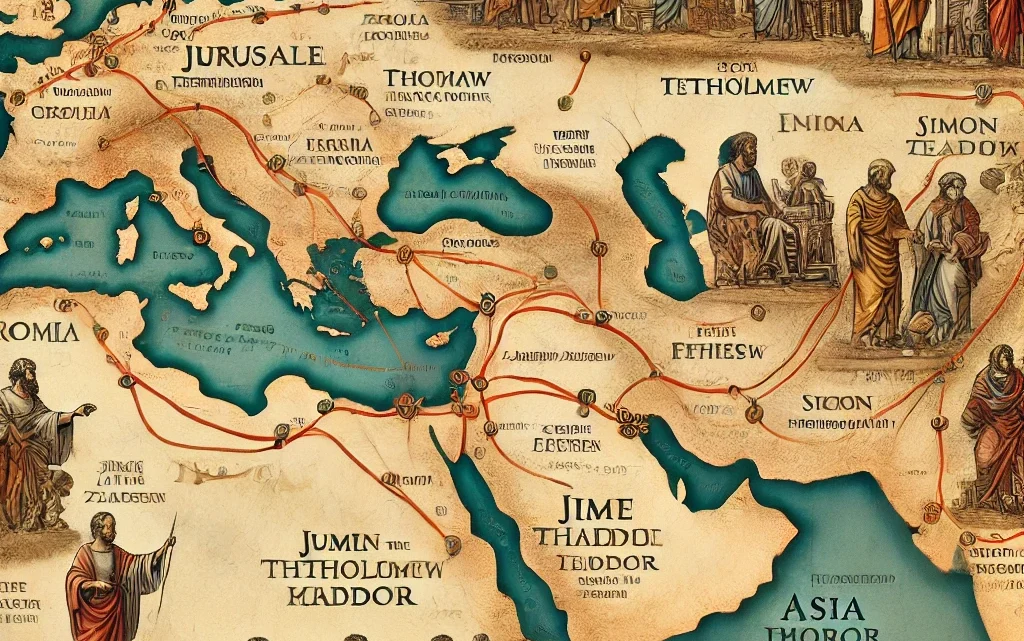“From Jerusalem to the Ends of the Earth: The Apostolic Journey After Yeshua”

Introduction:
The apostles, tasked with spreading the teachings of Yeshua, embarked on extraordinary journeys that transformed the world. Their dedication, perseverance, and ultimate sacrifices laid the foundation for the early Christian Church. This post explores the apostles’ missions, highlighting their travels, teachings, and martyrdoms.
30-33 AD: The Crucifixion and Resurrection of Yeshua
Yeshua’s crucifixion and resurrection marked a turning point for the apostles. Following the Great Commission and the descent of the Holy Spirit at Pentecost, Peter’s powerful sermon converted about 3,000 people, setting the stage for the spread of the Gospel.
33-42 AD: Early Ministry in Jerusalem
- Peter and John: They performed miracles and preached in Jerusalem, facing opposition from Jewish leaders (Acts 3-4).
- Stephen’s Martyrdom (circa 34 AD): Stephen’s stoning sparked the first significant persecution of Christians (Acts 7).
- Philip the Evangelist: He preached in Samaria and converted an Ethiopian eunuch (Acts 8).
42-49 AD: Expansion Beyond Jerusalem
- James the Great (circa 44 AD): The first apostolic martyr, executed by King Herod Agrippa I (Acts 12:1-2).
- Peter’s Escape (circa 44 AD): Peter’s miraculous escape from Herod’s imprisonment (Acts 12:3-19).
- Paul (Saul) and Barnabas: Commissioned for their first missionary journey, spreading the Gospel in Cyprus and Asia Minor (Acts 13-14).
49-60 AD: Missionary Journeys and Apostolic Activities
- Paul’s Missionary Journeys:
- First Journey (47-49 AD): Travelled to Cyprus and Asia Minor (Acts 13-14).
- Second Journey (49-52 AD): Journeyed through Asia Minor and Greece (Acts 15:36-18:22).
- Third Journey (53-57 AD): Revisited churches in Asia Minor and Greece (Acts 18:23-21:16).
- Peter: Preached in Antioch and other regions before traveling to Rome, where he became a central figure in the early church.
- James the Less: Led the Jerusalem church and authored the Epistle of James (circa 50-62 AD).
60-70 AD: Apostolic Martyrdoms and Later Travels
- Paul: Arrested in Jerusalem (circa 57 AD), imprisoned in Caesarea, and eventually martyred by beheading under Nero in Rome (circa 64-67 AD).
- Peter: Traveled to Rome and was martyred by crucifixion under Nero (circa 64 AD), traditionally upside down at his own request.
70-100 AD: Spread of the Apostolic Legacy
- John: Exiled to Patmos, where he wrote Revelation (circa 95 AD). Later returned to Ephesus, writing the Gospel of John and the Epistles of John, and died of natural causes around 100 AD.
- Thomas: Traveled to India, established Christian communities, and was martyred by spearing (traditionally on December 21, AD 72).
- Andrew: Preached in Scythia and Greece, martyred by crucifixion on an X-shaped cross in Patras, Greece.
- Philip: Preached in Asia Minor and was martyred by crucifixion in Hierapolis.
- Bartholomew (Nathaniel): Preached in Armenia and India, martyred by being flayed alive and then beheaded in Armenia.
- Matthew: Preached in Ethiopia, martyred by stabbing in Ethiopia.
- James the Less: Remained in Jerusalem and was martyred by being thrown from the pinnacle of the Temple and then clubbed to death (circa 62 AD).
- Simon the Zealot: Preached in Persia and was martyred by being sawn in half.
- Jude Thaddeus: Preached in Mesopotamia and Persia, martyred by being clubbed to death and then beheaded in Persia.
Conclusion:
The apostles’ unwavering faith and determination to spread Yeshua’s teachings were pivotal in establishing the early Christian Church. Their journeys, filled with challenges and ultimate sacrifices, continue to inspire believers today. Their legacy is a testament to the transformative power of faith and dedication.

